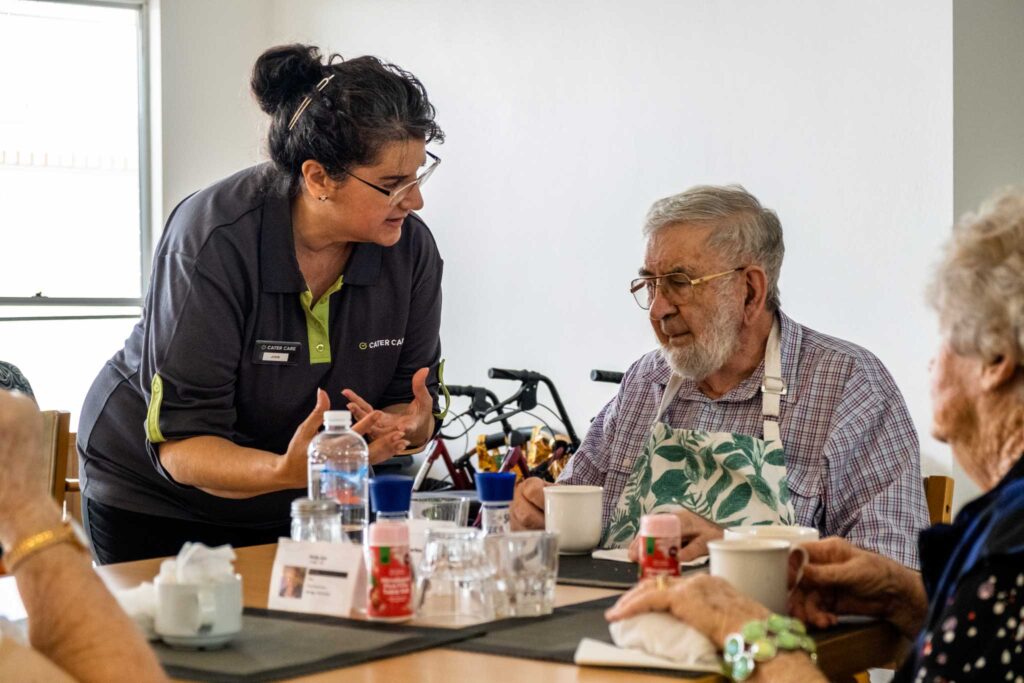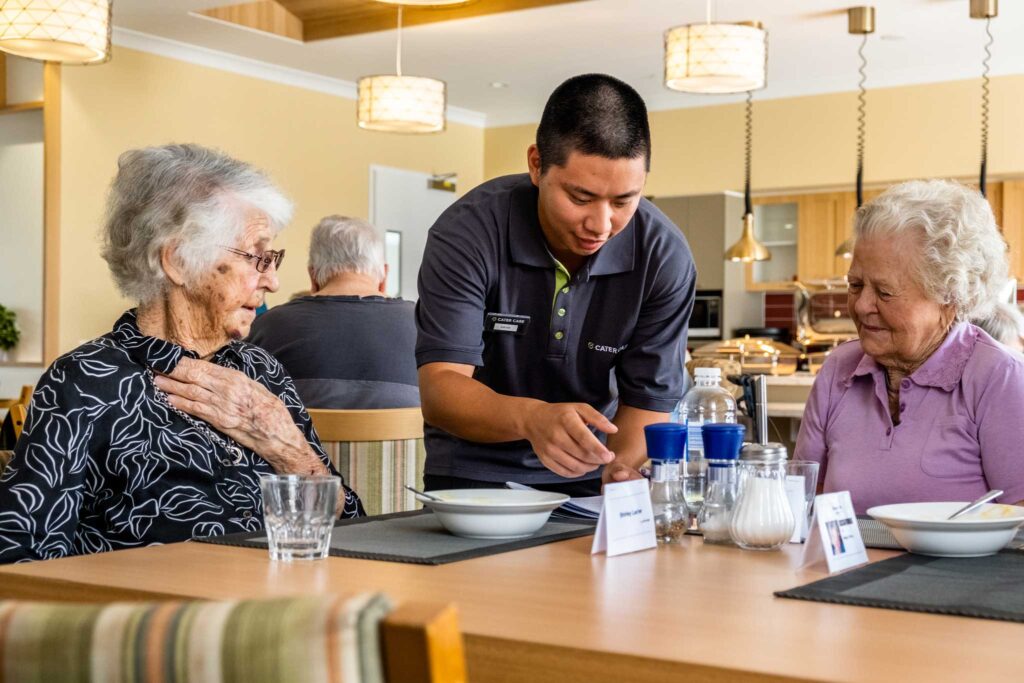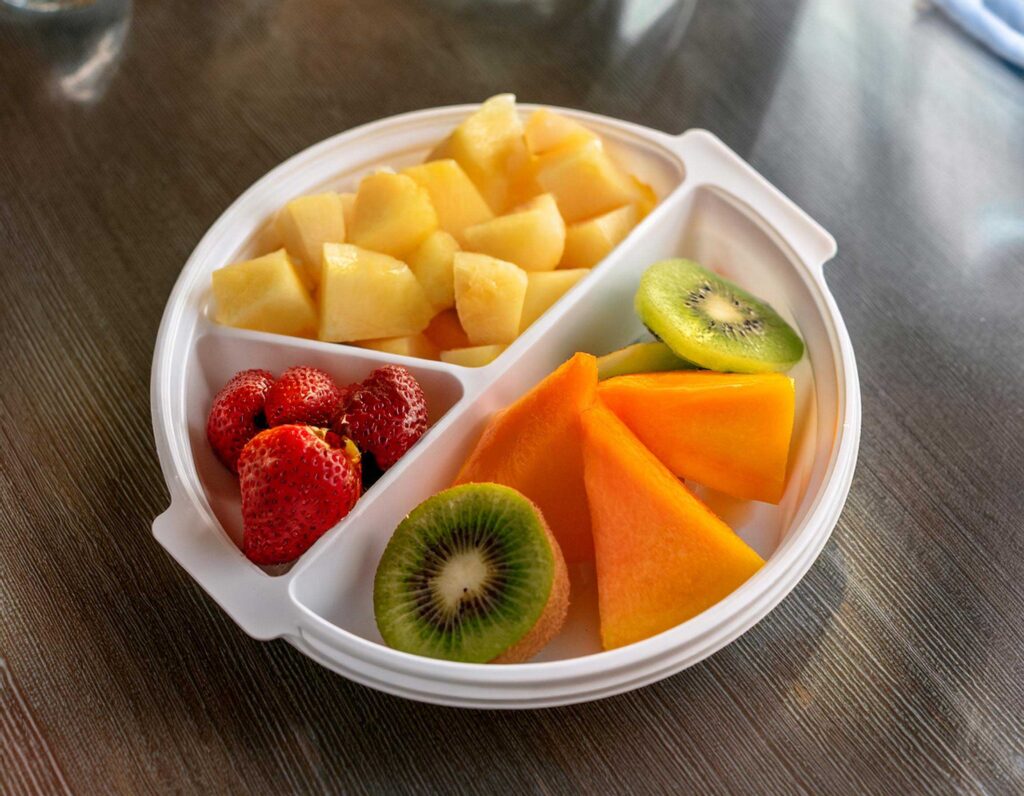Affecting a person’s mood, memory, thinking, and behaviour, the term dementia describes a collection of symptoms of various illnesses that cause a progressive decline in someone’s cognitive function. It’s a broad term, but the illnesses that cause it are distressingly common – Dementia Australia estimates that up to 54% of aged care residents are affected by the disease in some way.¹
In addition to the impacts on the brain, dementia can also impact people’s ability or willingness to eat and drink, increasing their risk of malnutrition. This Dementia Action Week, we’re taking a look at how dementia can impact care residents, and how quality aged care food services can help them to enjoy meaningful mealtimes.

Dementia Action Week is a major awareness campaign run by Dementia Australia that encourages everyone to learn more about what dementia is and what they can do to help tackle it head-on in their communities. As one of Australia’s largest providers of aged care food services, this is a campaign that’s near and dear to our hearts.
How can dementia hurt a resident’s diet?
No area of life is left untouched by the impacts of dementia. Its symptoms vary depending on the exact diagnosis and the individual’s personal circumstances, but when it comes to food and nutrition residents can experience:

How can a quality caterer help?
While dementia can present serious challenges for the resident and their care provider, the implementation of well-designed aged care food services can help support a resident’s dietary intake and have a positive impact on their quality of life. Here at Cater Care, we ensure residents with dementia can still enjoy a healthy diet by employing a few mealtime strategies.
For a resident who forgets mealtimes and may experience distress if asked to attend a set time, we focus on making the most of their appetite whenever it naturally presents itself; having easy-to-eat snacks that are always available somewhere open to the resident means that they can eat whenever it takes their fancy. Additionally, adding additional vitamins and minerals (food fortification) to these mid meals and snacks can help make up for the issues caused by missed meals.

Some residents with dementia might struggle to use cutlery. Offering finger foods that are nutritious and easy to eat can both resolve this and make for excellent easy-to-eat snacks mentioned above. These might range from crumpets, to french toast fingers, to freshly sliced portions of fruit.
For residents experiencing a loss of appetite, it’s important to remember the role that scent plays in the sensory experience. Residents who can hear and smell their food being prepared often experience increased appetites as a result,³ and Cater Care’s commitment to cooking every meal fresh on-site means there’ll be no shortage of mouth-watering aromas coming from the kitchen.
While routines are often a source of comfort for residents with dementia, there can also be value in providing tightly-controlled new experiences to help create some truly meaningful mealtimes. Our Secrets from the Kitchen and Major Themes resident engagement programs help care teams present exciting new dining experiences within the familiar comfort of their care facility, and can be a strong source of enrichment for residents suffering from dementia.
Finally, finishing a meal requires a degree of concentration that someone with dementia may find difficult to maintain. We recommend a simplified table setting that offers one plate at a time, limits the use of different crockery and glasses, and ensures that food and drink are served separately. This can help improve the resident’s intake by reducing confusion and distractions.
While these broad strategies can be helpful, every situation is different, and every resident with dementia might require their own specific support to meet their dietary intake targets. That’s why all our aged care staff complete our Understanding Dementia training course to ensure they can approach these interactions with the care and compassion needed to help residents enjoy a positive dining experience.
Building a dementia-friendly enjoyable dining experience
While Dementia Action Week’s calls to help manage dementia might make you think of CT scans and custom built living spaces, don’t underestimate the important role food and nutrition play. Ensuring that your residents with dementia maintain a rich and varied diet supplied by an aged care food services provider with a focus on supporting your resident’s unique dietary needs can go a long way towards helping make their dining experiences more enjoyable and improving their quality of life.
If you’d like to work with a catering partner who places a genuine focus on supporting your residents with extra needs, then get in touch with our Aged Care expert via the details below.

References
¹Dementia Australia. 2024. “Dementia Facts and Figures.” www.dementia.org.au. Dementia Australia. August 27, 2024. https://www.dementia.org.au/about-dementia/dementia-facts-and-figures.
²Dementia Australia. 2024a. “Eating | Dementia Australia.” www.dementia.org.au. Dementia Australia. August 5, 2024. https://www.dementia.org.au/living-dementia/home-life/eating.
³Aged Care Quality and Safety Commission. 2023. “Food, Dining and Nutrition Analysis of a Survey of Food and Dining Experiences in Residential Aged Care Services Final Report.” The Royal Commission into Aged Care Quality and Safety. The Royal Commission into Aged Care Quality and Safety. https://www.agedcarequality.gov.au/sites/default/files/media/analysis-of-food-and-dining-experiences-in-residential-aged-care-survey-final-report.pdf.